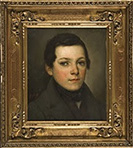

‘Listen, Mr. Juglaris, we know very well that you need to sell, but you are so proud and haughty that your paintings are left aside. If you were more humble, more compliant, you would obtain something.’ I replied that the king or prince who would receive a supplication from me had not yet been born and, as for the others, rather than lowering myself I would rather have gone to sweep the streets."


As a muralist, Juglaris was constantly improving his skills in drawing the human figure. He applied his growing flair in this realm to a series of easel paintings that were successfully exhibited at Turin’s Society for the Promotion of Fine Arts (Societa Promotrice delle Belle Arti), which welcomed emerging artists to its salon at the Palazzo di Carlo Creppi. Admission soon followed to Turin’s elite Artists’ Circle (Circolo degli Artisti). He was jointly nominated by artists Rodolfo Morgari and Giovanni Zuliani, the latter a dear and loyal friend. As an entry requirement above and beyond the annual dues of sixty lire, Juglaris submitted a painting entitled The Friar and the Gentleman (1870), intended to display and substantiate his competence, if not virtuosity, as an artist. Today, it remains a part of the Artists’ Circle permanent collection.

However gratifying, official recognition as a fine artist did not sell paintings for Juglaris. In posture and personality he could be proud and prickly, intense and easily offended. This was not a winning way for a young artist who needed patrons and commissions to thrive in the fine arts. When Juglaris complained about his difficulties to the secretary of the Society for the Promotion of Fine Arts, he did not receive much sympathy. He was informed in no uncertain terms that he needed to be “more humble, more compliant” in order to gain patronage, even to the point of begging the support of a royal prince or a wealthy member of the Artists’ Circle. Yet once again Juglaris refused to humble himself in the position of a supplicant.
Although Juglaris never had to “sweep the streets” as he vowed to do rather than to toady to patrons, he remained mostly reliant on decorative commissions and mural work for his livelihood. These were projects more readily secured on the basis of his talent and ability without so readily compromising his sense of personal dignity and self-esteem.